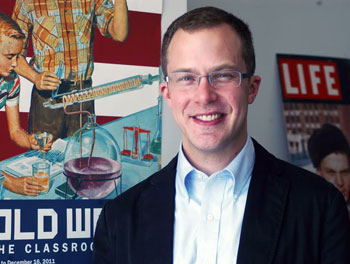Moneyball Throws a Curve
By Elizabeth Jeffries

What does medicine share with baseball and the law? According to Christopher J. Phillips, a new assistant history professor in CMU’s Dietrich College of Humanities and Social Sciences, the answer may be Moneyball.
The concept was first made popular by the 2003 Michael Lewis book “Moneyball: The Art of Winning an Unfair Game.” Then, in 2011, a film adaptation of the book starring Brad Pitt introduced even more people to it. Moneyball involves the use of mathematical tools and methods to construct winning sports teams, but it is also much more than that. It is about a fundamental shift in how we see the world.
In Phillips upcoming spring course, “Moneyball Nation: Data in American Life,” Phillips will dig deep into the history of topics including baseball, medicine and the law, while exploring how and why Americans have come to believe that mathematical and computational methods can solve complicated problems, even in seemingly unrelated subject areas.
The course will certainly benefit students who are interested in data analysis, but will also prove useful for students in other disciplines, such as the arts. Phillips stresses that the course will provide a set of tools for asking both the “how” and “why” questions about data analysis in these unconventional areas.
“Even students who envision becoming poets, actors or athletes will want to know more about the new 'data sciences' and how ‘quants’ are changing the way business is done in all kinds of fields. You may love or hate the idea that the success of a film can be predicted analytically through the quantification and analysis of its components, but this course will try to get you to think critically about the claims… and what’s ‘lost’ by their use,” Phillips said.
 “Moneyball Nation” has been designed to not only create buzz about the power of new approaches to different topics, but also to think critically about the benefits of replacing certain forms of expertise with quantification and computation-driven systems. Students at Carnegie Mellon University are innovative thinkers; as Phillips stated, “They [students at CMU] want to learn about the powerful ways our world is being transformed.”
“Moneyball Nation” has been designed to not only create buzz about the power of new approaches to different topics, but also to think critically about the benefits of replacing certain forms of expertise with quantification and computation-driven systems. Students at Carnegie Mellon University are innovative thinkers; as Phillips stated, “They [students at CMU] want to learn about the powerful ways our world is being transformed.”
Steven Schlossman, professor of history and director of the department’s undergraduate studies agreed.
“This is a general education course that every student should take,” Scholssman said. “It is a history course that will join together students from all disciplines. It is everything Carnegie Mellon stands for in scholarship. It is consistent with the larger mission of reaching out to develop courses that speak to the professional goals of the rest of the campus.”
The class is designed to do more than just chart this history of data and quantification; it will help students understand the way these methods are supposed to change our understanding of the phenomena itself.
“What is interesting about Moneyball is the concept of making decisions in a way that exploits the underlying reasons, the things you did not initially think were important but are actually the most important,” Phillips said.
In addition to Moneyball Nation, students who are interested in sports statistics should take note of the Tartan Sports Analytics Club (TSAC), a new student organization that was founded by undergraduates in the Statistics Department. TSAC members write articles on the quantitative analysis of sports and attend conferences on sports analytics.
Samuel L. Ventura, the club’s faculty advisor, a visiting assistant professor of statistics and analytics consultant to the Pittsburgh Penguins, pointed out that there are many other exciting opportunities at CMU for students interested in statistics.
"We offer several courses on modern statistics that are heavily application driven, so that students get a hands-on education of applied statistics and data analysis,” said Ventura, who is also a CMU alumnus.